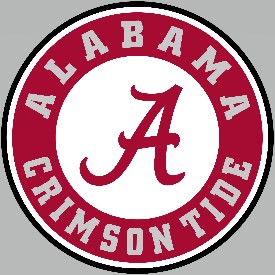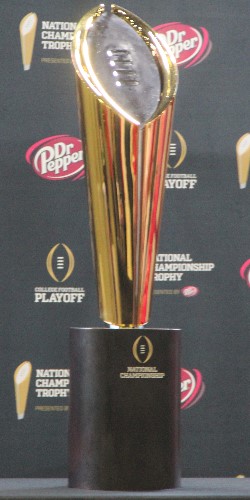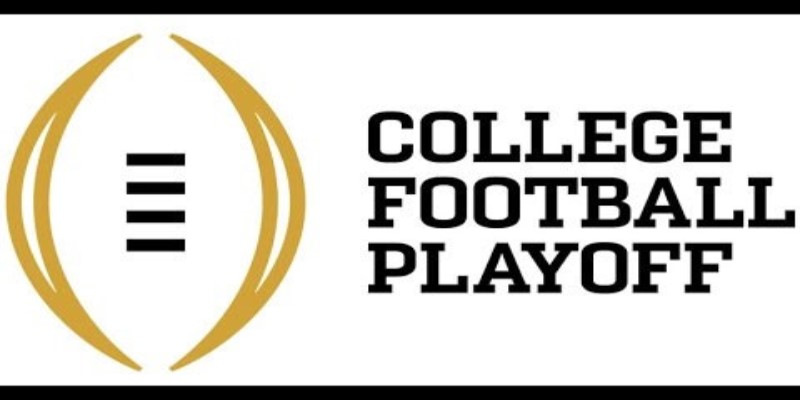We’ve entered that post-championship time of year when we turn our attention towards ways we can make the game better. In other words: Which would be the best playoff model for college football to adopt? I’ve taken it upon myself to end this childish debate.
A Six-Team Playoff is the Ultimate Solution
First, playoffs were never designed as a full-proof solution to include the absolute best teams. We need to get that foolish notion out of our heads. Playoffs were designed to include winners.
Almost every year in each sport there are teams that get left out, sometimes even with a better record. This is because they did not take care of the first step, which is to win your respective division or conference. (Think the 2010, 7-9 Seattle Seahawks here) If you do this — if you win – then you’re one step closer to the ultimate prize.

NO BAMA! Under this six-team model, Alabama doesn’t make it in 2017
No team starts the season with the goal of: “Boy, I hope we play well enough to put ourselves in the position to possibly look good enough. And maybe, kinda’, sorta’ make an argument that we are possibly good enough to move on to play more games, which might enable us to have a possible chance to win the championship.”
If this is a team’s thinking — timid and meandering — then they’ve already lost. Absurd statements like this don’t get made (I hope).
A college football team’s first goal is to win its respective division (or best two teams in the Big 12), then proceed through the next steps in the process until some bland dolt in a suit — who probably doesn’t even know what a first down is and wonders why yards are used instead of meters — finally hands your coach a trophy and calls you a national champion.
Obviously, our current system undermines this basic principle of winning. A team can take care of that gigantic step of winning their conference, only to be left out in the cold. Under an incentivized winning system, there’s no thinking, arguing, or debating involved. A winner wins and instinctually moves on to stalk its next pray.
Lions are the king of the jungle because they win. Lions don’t sit around — like the College Football Playoff Committee — trying to figure out which amongst them have the best skill set to take down a wayward zebra. That’s because if they did, by the time they got things figured out, the lion would already have a zebra’s neck stuck in its teeth, and…
Okay, I’ll digress from my absurd lion analogy. The point is, let’s take the “thinking” out of the equation and let the winning do the talking.
Oh, But Wait a Second…

THE TROPHY: Under this playoff setup, a team would just keep winning until they got handed one of these.
Here in college football land, as much as we have historically hated having to debate over who the top teams are, we kind of loved it even more.
That’s right. In a six-team playoff, we fulfill our lust for a good old-fashioned debate by having to decide which two teams are worthy enough of a first-round bye. So, essentially, we get to keep our love and hate of the original Bowl Championship Series top two teams debate, while assuring that everything is still settled on the field by adding four more teams.
The nuts ‘n’ bolts of the six-team scenario is very simple: The winners of the Power Five conferences make the playoff, while a Group of Five team can only make it if they go undefeated. (Ok, if there’s more than one that presents a problem, no plan is perfect, so we go with the higher-ranked team). If there is no undefeated Group of Five, then we go with one at-large bid.
With six teams, things are settled on the field and we get to keep our love and hate with a “healthy” debate. It’s the system that presents the best of both worlds and it’s sitting on the table right in front of us. To quote the legendary movie and play “Glengarry Glenross,” “Are we (you) gonna take it? Are we (you) man enough to take it?”
The Other “Solutions”
The Eight-Team Playoff: This would be my reasonably close second choice. You simply add two more at-large teams. This would eliminate the fiery debate over which two teams get a bye, while increasing debate over which teams get an at-large bid.
My problem with this — as mentioned above — is that I prefer the playoffs to be an exclusive club of winners with the top-two winners getting an extra bonus. It also removes instances where a team, who has already won a spot in their conference championship game, might rest players in their final regular season game(s) by giving them something more to play for.
The 12-Team Playoff: Just dumbs down the ingenious six-team model. And who wants to be like the NFL anyhow?

LIONS: They don’t contemplate what to do, they just win. Having said that, this is how many fans want to treat the zebras after a questionable call.
The 16 (or more, ugh) Team Playoff: This is essentially for fans who want a football version of March Madness. But, too many losers would get invited to what should be an exclusive club. The Joe Average’s of the world don’t belong in country clubs; and third, fourth, and even fifth-place teams in a conference don’t belong in playoffs.
Many teams who just lost their conference championship game would get in, as well as those who didn’t even get that far. Again, let’s not reward losing while simultaneously devaluing the conference championship games. They should be treated like playoff games: It’s win or go home.
In Closing
With the six-team model you essentially have an 11-team playoff with 10 teams competing in conference championships games, plus one at-large. This covers the two best teams from each Power Five being in the playoffs, there’s no need for a third-placer. If you’re a fan of some third-place team, don’t hate the playoff, hate your team for not winning more. Participation awards need not apply.
Ah, the always taxing process of deciding the college football champion, time to take the power away from the suits, and let the wisdom of winning decide the day.
Darren Perkins
Spokane, WA
Top photo credit: Wikimedia Commons
Related Articles:
Unbelievable...Same SEC Stuff, Different Day
Why Oregon Football Always Belongs in the National Conversation
The B1G Won the 2026 Coaching Carousel...Big-Time!
Continuity? Lanning's Hiring Success is Put to the Test
Why Whether Dyer Was Down or Not...Doesn't Matter
How to Analyze Football Talent Like a Pro
Darren Perkins is a sales professional and 1997 Oregon graduate. After finishing school, he escaped the rain and moved to sunny Southern California where he studied screenwriting for two years at UCLA. Darren grew up in Eugene and in 1980, at the tender age of five, he attended his first Oregon football game. His lasting memory from that experience was an enthusiastic Don Essig announcing to the crowd: “Reggie Ogburn, completes a pass to… Reggie Ogburn.” Captivated by such a thrilling play, Darren’s been hooked on Oregon football ever since. Currently living in Spokane, Darren enjoys flaunting his yellow and green superiority complex over friends and family in Cougar country.

